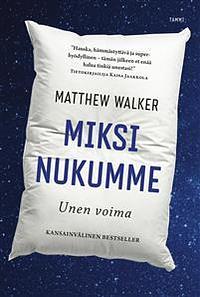Take a photo of a barcode or cover
This is probably the best nonfiction book I have ever read. It is so informative and has so much good data and research to back it up. Honestly, I literally could not recommend this more. Everyone should read this.
challenging
informative
inspiring
reflective
medium-paced
This book is revolutionarily against our modern world and it's relationship the the most foundational part of being human: Sleep. It so convincingly lays out all the reasons that our bodies and minds benefit from healthy sleep and are actively deteriorated by deficient (time and quality) sleep. This is a book of read by everyone would actually change the world into a more human (and less mechanized) place
Here are some questions this book answers
1) Why we sleep?
2) What are the stages of sleep?
3) How does sleep prevent chronic illness?
4) How does sleep help you process information and memories?
5) How different living beings sleep on the planet?
6) What neurotransmitter helps you fall asleep through the day?
7) What hormone is responsible for helping you fall asleep?
8) What is the impact of technology use on sleep?
9) What are the connections between sleep and learning?
10) How does sleep make you more productive at work?
There are four simple sections and you can read them in random order. They are a bit academic but also quite accessible. The author has spent twenty years of his life studying the subject. He summarizes several academic studies about sleep in this book. By the end of the book, I realized that sleep is the universal health care provider. We sleep for 1/3 rd of our life. Bad habits early in life compound over time and can lead to several ailments. Here are some tips to a good night's sleep
- Sleep at the same time and wake up at the same time
- Have a nightly sleep time ritual
- Avoid coffee and naps after 2 pm
- Maintain a cool temperature before you get to bed
- Avoid technology and bright lights in the house in the evenings
- Get lots of natural light and movement through the day
- Meditate for a few minutes to calm your mind before you sleep
- Have positive associations in your head about sleep and your place of rest
- Don't stay in bed for more than 25 minutes if you are not getting sleep
There are lots of great podcasts and lectures that I listened to while reading this book including
1) 6 part audio lecture series between Dr. Walker and Dr. Huberman on sleep - https://www.youtube.com/watch?v=-OBCwiPPfEU
2) Dr. Walker Sleep TED Talk - https://www.youtube.com/watch?v=5MuIMqhT8DM
1) Why we sleep?
2) What are the stages of sleep?
3) How does sleep prevent chronic illness?
4) How does sleep help you process information and memories?
5) How different living beings sleep on the planet?
6) What neurotransmitter helps you fall asleep through the day?
7) What hormone is responsible for helping you fall asleep?
8) What is the impact of technology use on sleep?
9) What are the connections between sleep and learning?
10) How does sleep make you more productive at work?
There are four simple sections and you can read them in random order. They are a bit academic but also quite accessible. The author has spent twenty years of his life studying the subject. He summarizes several academic studies about sleep in this book. By the end of the book, I realized that sleep is the universal health care provider. We sleep for 1/3 rd of our life. Bad habits early in life compound over time and can lead to several ailments. Here are some tips to a good night's sleep
- Sleep at the same time and wake up at the same time
- Have a nightly sleep time ritual
- Avoid coffee and naps after 2 pm
- Maintain a cool temperature before you get to bed
- Avoid technology and bright lights in the house in the evenings
- Get lots of natural light and movement through the day
- Meditate for a few minutes to calm your mind before you sleep
- Have positive associations in your head about sleep and your place of rest
- Don't stay in bed for more than 25 minutes if you are not getting sleep
There are lots of great podcasts and lectures that I listened to while reading this book including
1) 6 part audio lecture series between Dr. Walker and Dr. Huberman on sleep - https://www.youtube.com/watch?v=-OBCwiPPfEU
2) Dr. Walker Sleep TED Talk - https://www.youtube.com/watch?v=5MuIMqhT8DM
Prose/Readability: 5
Commitment to Objective/Unbiased Truth: 4
Interesting Content: 4
Perspective Shift: 3
Commitment to Objective/Unbiased Truth: 4
Interesting Content: 4
Perspective Shift: 3
I wish that there was a bit, maybe a lot, more on how to go about getting a good, natural sleep.
informative
slow-paced
It's 9:43 and I really need to start getting ready for bed soon. And make sure the bedroom is cool, dark, soundless, no alcohol or caffeine in my system, otherwise . . . I'm doomed to suffer obesity, Alzheimer's disease, high blood pressure, stroke, cancer, high cholesterol, and heart disease.
I'll probably have trouble sleeping just thinking about all the bad things that will happen if I don't get enough sleep.
I'll probably have trouble sleeping just thinking about all the bad things that will happen if I don't get enough sleep.
Bála jsem se, že bude kniha moc repetetivní a opakvat jen stará zřejmá fakta, ale příjemně překvapila a v pár ohledech mi i otevřela oči. Doporučuji hlavně lidem, kterým "fakt šest hodin spánku stačí" a ještě víc těm, kteří si myslí, že je spánek přeceňovaný.
Speciálně by si ji měl přečíst náš pan premiér, než se bude příště chlubit 16hodinovou pracovní dobou.
Speciálně by si ji měl přečíst náš pan premiér, než se bude příště chlubit 16hodinovou pracovní dobou.




